Blog Archive for 5/20/04 - 6/5/04
The Resignation of George Tenet as a Moral Mirror
Posted at 9:00 p.m. on Thursday, June 3, 2004
Today CIA Director George Tenet resigned. According to President Bush, Tenet did so “for personal reasons.” Tenet himself elaborated further in his speech to the CIA staff. I want to quote what he said verbatim. I'd urge you to read it carefully:
|
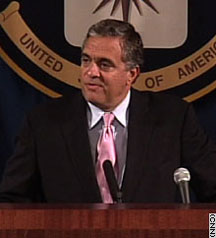 |
|
We're going to go to class together. We're going to party together. I'm going to learn how to instant message his friends—that would be an achievement!
You've just been a great son, and I'm now going to be a great dad.
Of course pundits and politicians, especially those who aren’t particularly fond of George W. Bush, were quick to dismiss Tenet’s explanation as they sought the “real reason” behind the resignation. This reason generally had to do with the Bush administration’s desire to force Tenet to take the fall for the President, who, contrary to his public statements, is alleged to have ordered Tenet’s resignation.
Now I’m quite aware that politics can be a dirty business, and that Tenet’s motivations for resigning were complex. Nevertheless, I find the discussion of the resignation – by all parties in the conversation – to be telling, sadly telling.
From what has been said – and NOT said -- by supporters and opponents of the Bush Administration alike, most of the talking heads simply can’t comprehend that Tenet would actually resign because he wants to be a better dad. This tells us far more about the talking heads than about the CIA head himself. Consider, for example, the comments of former CIA chief Stansfield Turner. He says that he disbelieves Tenet’s stated reason for resigning. “I think he’s being pushed out or made a scapegoat,” Turner explained. Now of course Turner might be right. But it sounds to me like he simply can’t believe that a man of Tenet’s position and power would actually resign because he put his family above his career.
I’ve spent quite a bit of time today listening to the radio and surfing the ‘Net, taking in a wide array of comments about Tenet’s resignation. Most people, even Tenet’s supporters, speak of it in terms of political and professional calculations. It seems like there’s just no place in people’s minds for putting family in front of work.
Moreover, in all of my listening and reading, so far I’ve heard no one praise Tenet for deciding that being a good dad is his highest priority in life. So let me break ranks by saying that I deeply appreciate George Tenet’s stated reason for resigning. And as I read what he told his CIA colleagues about his son, I can fully empathize what he’s saying. He sounds to me like a man who realizes that his time with his son is running out, and that being a good dad matters more than anything else.
Most politicians and pundits can’t relate to this because they put their careers first and their families second (or third, or fourth, or lower). These priorities are so deeply ingrained that they simply become a given. Thus when George Tenet claims to put fatherhood first, it’s as if he’s speaking Aramaic without subtitles. Most people just don’t get it.
Thus the resignation of George Tenet holds up a moral mirror, inviting us to examine our own values. How do we weigh family and work? What comes first in our lives? What comes first in our society? However we might answer this question for ourselves, we should know that the people of greatest influence in our society generally put family second (or lower), and they expect us to do the same.
But not all of us do. There are some people who get things in the right order, putting family above fortune, parenthood above professional success. Let me site two examples among many.
A woman I know was a huge success in her professional life. A graduate of one of the nation’s top business schools, she quickly rose to a lofty position in her prominent company. Even though she was in her early 30’s, she was put in charge of cutting-edge projects and hundreds of employees, just the sort of thing she had dreamed of doing. But after her children were born, she found it increasingly difficult to manage the demands of work and family. Her company made it clear that they expected to come first. So this woman resigned because she cared first about being a great mother.
I have another friend who quickly climbed the ladder of business success in his law firm. Making partner at an early age, he commanded an impressive income. But his firm expected him to work 70-80 hours per week. Even though he was willing to reduce his income so that he could work fewer hours and spend more time with his kids, his partners couldn’t accept it. Soon my friend saw that he had a choice between being a great lawyer or being a great dad. He resigned from his firm and put fatherhood first.
In the days ahead we may learn more about why George Tenet resigned. It may turn out that he was forced out, and that he made up the story about his son to cover the Bush Administration’s hind quarters. But I rather doubt it. The man who said what he did about his son isn’t making up excuses for the sake of the President. Rather, he’s telling us what now matters most to him. More than professional success, more than political power, George Tenet wants to be a good dad to John Michael.
Thank you, Mr. Tenet, for modeling in such a public way what it means to live with your priorities in the right order. Thanks for holding up a mirror so that I can examine my own choices as a professional and a parent. I hope many others in our nation will do the same.
Irony of Ironies
Part 5 of the series “Harvard Ironies”
Posted at 10:00 p.m. on Wednesday, June 2, 2004
| One of the most popular movies in 1970 was the tear-jerking classic, Love Story. It starred Ryan O’Neal as Oliver Barrett IV and Ali McGraw as Jennifer Cavilleri, both of whom were students at Harvard. (Technically, Jennifer was a student at Radcliffe College.) This was the movie that popularized the (un)forgettably profound line, “Love means never having to say you’re sorry.” Parts of Love Story were filmed on the Harvard campus. One key building, called Barrett Hall in the movie, was in fact Emerson Hall, the haunts of the Harvard philosophy department. | 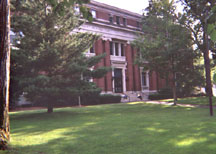 |
As an undergraduate at Harvard I concentrated (majored) in philosophy. Thus I spent countless hours in Emerson Hall, sitting through lectures and arguing in discussion sections. Though philosophy students were required to take a few courses in the history of philosophy, for the most part we studied contemporary philosophy, including logic and philosophy of language. In these classes I learned that truth was merely a human construct, and that God was basically irrelevant to human thought. One of my professors actually acknowledge that the existence of God was 50% probable. I expect the Lord was glad to hear that!
The fact that the great Harvard philosophers inhabited Emerson Hall struck me as extraordinarily ironic, but not because this building had co-starred in Love Story. Rather, the irony of ironies had to do with what was engraved in stone on the outside of Emerson Hall. There, in giant letters, was a portion of Psalm 8: “WHAT IS MAN THAT THOU ART MINDFUL OF HIM.” This line, a portion of Psalm 8:4, calls us to humility before the wonders of the Creator God. It reminds us of our smallness and weakness when compared with the greatness and power of the Lord. Yet, inside the hallowed walls of Emerson Hall, some of the greatest minds of the 20th century reversed the order. |
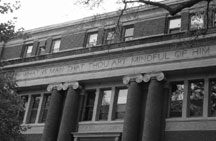 |
|
A black and white close-up
of the inscription on Emerson Hall. |
||
Had Emerson Hall been built in the 1970’s (and in the years since), it might well have been inscribed with “WHAT IS GOD THAT THOU ART MINDFUL OF HIM.” Or perhaps “MAN IS ALL WE HAVE TO BE MINDFUL OF.” (Of course the use of “man” as a generic would never be tolerated today!)
It’s almost too easy to laugh at the irony of Emerson Hall with its erudite atheist inhabitants. But before I chuckle too hard, I ought to examine my own life. Though I believe in God, am I living humbly before God today – really? Moreover, am I living as if I had relationship with the all-powerful Creator of the universe? Do my prayers reflect this sort of faith?
Psalm 8 concludes with a double punch line. On the one hand, it reveals that we have been made “a little lower than God” and been given dominion over God’s creation (8:5-8). So, though humbled by God’s greatness, we nevertheless have been honored by him as his royal stewards. On the other hand, the Psalm concludes as it began, with praise of God’s greatness: “O LORD, our Sovereign, how majestic is your name in all the earth!” (8:9). Here is a verse that ought to be engraved upon our minds and hearts!
Thanks and Praise
Part 4 in the series “Harvard Ironies”
Posted at 10:00 p.m. on Tuesday, June 1, 2004
| The day of my graduation from college began
with a baccalaureate service in Harvard’s Memorial Church. There,
in a packed room, we sang barely religious hymns and heard inspiring
addresses from university officials. God was surely present in this
gathering, but his name was rarely mentioned.
The non-religious tone seemed to change, however, when the President of Radcliffe College addressed us. “The Baccalaureate service honors a fine tradition in this university,” she began. “It is a service of thanks and praise.” “Wow!” I thought to myself. “So we’re actually going to acknowledge God in this service.” “So,” the Radcliffe President continued, “in faithfulness to that tradition, I want to thank you for your outstanding efforts during these past four years and praise your for your great accomplishments!” |
 |
|
Memorial Church
at Harvard |
||
Okay, so I was wrong. Not exactly what I had in mind when thinking of thanks and praise.
Of course it’s good to thank people for their efforts and to praise them for their accomplishments. Where I live, people are far too stingy with these sorts of affirmation. But if all we do is thank people, we’re missing the greatest and most important part of thankfulness. And if we only praise human accomplishments, we’re failing to praise the greatest achievements of all.
There are many, many reasons why giving thanks and praise to God are so important for us. I’ll mention only one in closing. When I thank God for his gifts to me, when I praise him for his all-surpassing majesty, I put myself in my place. I am rightly humbled before the grace and glory of God. Such humility is good – no, it’s essential – for my soul. Yet, at the same time, when I acknowledge God with thanks and praise I am lifted up. I am drawn closer to God. And I begin to share a bit of his glory. But, knowing whose glory it is, I’m protected from the dangers of pride.
As you live today, be sure to thank and praise the people around you who deserve it. But don’t forget, above all, to thank and praise the God who deserves it all.
Truth . . . for
Christ and the Church!
Part 3 of the series "Harvard Ironies"
Posted at 10:00 p.m. on Monday, May 31, 2004
When I was in college and grad school, the Harvard seal was omnipresent. On library chairs and notebooks, on sweatshirts and university signs, wherever I turned, there was VE-RI-TAS, following my every move like the eye of God. Harvard was all about veritas, Latin for “truth.” But it wasn’t until I was well into my college experience that I learned the truth about the Harvard seal and the motto emblazoned upon it. Yes, the motto did contain the word veritas. But on the official official university seal veritas didn’t stand alone. It was joined to three other Latin words: christo et ecclesiae. The whole motto translated into English read: “Truth . . . for Christ and the church.” |
 |
This official motto, adopted by the university in 1692, was consistent with Harvard’s original vision for its educational purpose. Among the “Rules and Precepts” of 1646 was the following:
Let every Student be plainly instructed, and earnestly pressed to consider well, the maine end of his life and studies is, to know God and Jesus Christ which is eternal life (John 17:3) and therefore to lay Christ in the bottome, as the only foundation of all sound knowledge and Learning. And seeing the Lord only giveth wisedome, Let every one seriously set himself by prayer in secret to seeke it of him (Prov. 2:3).
Needless to say, somewhere in the last three centuries Harvard lost touch with its primary purpose, though the student body continues to include a healthy number of faithful Christians. The predominant view among most Harvardians these days, however, would be that truth is relative, and that there is no certain truth upon which to base one’s life. The idea that the pursuit of truth is for the sake of Christ and the church would considered an curious antique of a premodern (or pre-postmodern) age. Though I spent eight years in residence at Harvard, I still believe that there is such a thing as VERITAS, as Truth with a capital ‘T.’ Moreover, I even believe that human beings should pursue such Truth for the sake of Christ and the church. This pretty much explains why I do what I do, as a pastor, a professor, and a student of Scripture. In fact, I believe that with the governors of Harvard in 1646, that Christ is “the only foundation of all sound knowledge and Learning.” Yes, I may be a bit of an antique. But sometimes antiques are worth a whole lot more than newfangled contraptions. When it comes to truth, I think the founding leaders of my alma mater got it right. Truth, rightly understood, is indeed “for Christ and the church.” |
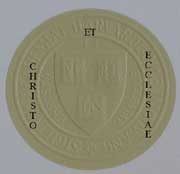 |
|
The official
university seal from my Ph.D. diploma. Around the middle shield
that reads VERITAS, you can barely see the Latin words CHRISTO ET
ECCLESIAE. |
||
The Only Check I’ll
Ever Write to Harvard
Part 2 in the series “Harvard Ironies”
Posted at 10:00 p.m. on Sunday, May 30, 2004
My process for applying to colleges was rather haphazard – so different from what most aspiring high schoolers experience today. I never visited any school to which I applied. I never bothered to correspond with admissions officials. I just sent off my applications, complete with typos and an embarrassingly presumptuous essay in which I claimed to know myself completely. Ugh!
I didn’t plan on applying to Harvard because I figured my chances of getting in were pathetic. I never even sent for an application. But my friend Joe invited me to a Harvard recruitment meeting, so I went along. On the way out of that meeting I grabbed what looked like a fat brochure about Harvard, and went on my merry way.
A few days before the submission deadline Joe asked if I had sent in my Harvard application. “No,” I admitted. “I don’t even have one.”
“Sure you do,” he said. “It’s in that brochure that we picked up.”
Checking when I got home, I discovered that Joe was right. I did have an application after all, so I decided to fill it out. What the heck!
I still remember writing out a check for the application fee. It was $15 or $20. As I wrote the words, “Harvard University,” I thought: “Well, this is the only check I’ll ever write to Harvard in my whole life.”
As it turned out, I was wrong about that. In fact I was a registered student at Harvard during seventeen consecutive years. The last seven I spent on official leave, living in Southern California while completing my Ph.D. dissertation. But Harvard still wanted its annual fees! It’s impossible to calculate how many checks I ended up writing to the University. Maybe a hundred? Maybe more? Looking back on all of this, I see the hand of God, guiding and protecting. At the time everything seemed so random and unpredictable. That’s the way life is while we're in the middle of living it. But, later on, we see how much God was involved in ways we had never imagined. |
 |
|
A night time
view of Widener Libarary, the main library at Harvard, where I spent
countless hours is college and grad school. |
||
I don’t recommend living quite as recklessly as I did during my senior year of high school. I believe life deserves more intentionality. But I also believe that when we realize God’s presence in our lives – even when we can’t perceive it – we are able to relax a bit more and enjoy what seem to us as unfolding mysteries.
That’s how I want to live today. Trusting God. Believing God. Seeking God. Glorifying God. And enjoying him and his generous gifts.
The Statue of the Three
Lies
Part 1 in the series "Harvard Ironies"
Posted at 10:00 p.m. on Saturday, May 29, 2004
| If you were to visit my alma mater, Harvard University,
no doubt you’d wander about in Harvard Yard. And, if you were
like thousands of other visitors to “The Yard,” you’d
end up getting your picture taken in front of the statue of John Harvard.
Or at least you’d think you had your picture taken in front of a statue of John Harvard. After all, the statue has the name “John Harvard” engraved upon it, along with the information that he founded Harvard College in 1638. But, in fact, none of these “facts” are true. That’s why students in the know refer to this monument to Mr. Harvard as “The Statue of the Three Lies.” What are the lies? 1. The carved man is not John Harvard, who left no visual representations of himself, but rather an unnamed person who sat for a sculptor in the 1800’s, two centuries after Mr. Harvard did. 2. John Harvard did not found a college at all. Rather, when he died in 1638, he left a small amount of money in his will to be used for the training of young men for Christian ministry (!). 3. The college (not called Harvard at this time, of course), was founded by the General Court of Massachusetts in 1636. |
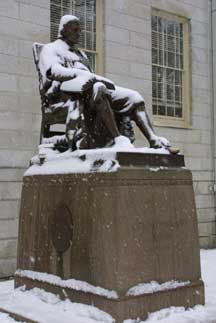 |
So, the statue supposedly of John Harvard, who founded Harvard College in 1638, is actually a statue of an unknown Harvard student, who represents the real John Harvard, who did not found a college in 1638, but who died in 1638, leaving money for a school that had been founded two years earlier. Rev. Harvard, who was known to be a passionate preacher, intended his gift to support the training of Christian ministers. (For more info on John Harvard, see this article.)
Given the current religious state of Harvard University – not exactly a paragon of Christian faith – there’s much irony here. But I want to focus for a moment on the deceptions of this statue. Surely they aren’t the sorts of lies that ruin lives or nations. Yet I find this statue to be a symbol for the reality of our culture. Whether we recognize it or not, we’re swimming in a sea of deceptions. Did you see the news story about the editor . . . .
I don’t want simply to complain about the deceitfulness of our world today. This gets tiresome. I do want to suggest to things that you and I can do to make a difference, albeit a small one. First, we can be steadfast in seeking the truth. Whether that truth is political, religious, historical, relational, or whatever, we need to invest our efforts to go beneath the façade and spin in order to find the truthful bedrock. Second, we can strive in our own lives to be people who speak and live the truth. As you might know, I’ve written a whole book about this, Dare to Be True. I’m convinced that, with God’s help, we can live truth-full lives. This will make a huge difference in our daily lives and closest relationships. And it will make a small dent in the larger world in which we live.
Random Acts of Kindness
Part 8 in the series “Salt and Light”
Posted at 10:00 p.m. on Friday, May 28, 2004
| Every year around Christmastime the junior high department of my church engages in one of their so-called “Random Acts of Kindness.” (In truth, these acts are carefully planned and not especially random. But who’s quibbling? Kindness is the real point.) A couple dozen junior highers with a few leaders gather up tons of wrapping paper, tape, and ribbon, and head off to the local Target department store. There, with the permission of the management, they set up a free gift wrapping booth. It’s really free, without gimmicks. Though they explain that they’re from Irvine Presbyterian Church, they won’t even receive donations should someone offer. These can go in the Salvation Army pail a few yards down the sidewalk. |  |
Several months after the latest gift-wrapping extravaganza at Target, I was out in a local coffee bar enjoying a latté. A woman came up to me and said, “You’re the pastor of Irvine Presbyterian Church, right?”
“Yes,” I answered, curiously. (You never know what to expect with this opening line.)
“Well, I want to tell you something about your church,” she said. I couldn’t tell from her affect whether I was about to hear something good or bad, so I prepared my defenses as she continued.
“Last December I was shopping at Target. I came out of the store and stumbled into your junior high department. They were doing that free gift wrapping thing, you know. Well, at first I thought there was some gimmick, like a fund-raiser or something. But the kids assured me that they were simply trying to help people. So I let them wrap a whole bunch of my presents. As I did, I watched them. I watched how they treated each other. I felt how they treated me. There was such love there, such care. I was blown away.”
At this point the woman was beginning to cry.
“I’ve been in lots of churches. And I’ve always been one of the workers, you know, one of those who gives and gives and gives. But I don’t think I’ve ever seen the kind of love I saw among your junior highers. And I don’t know when anyone has ever done something for me simply to be kind. I want you to know how much it meant to me. It was really wonderful. You’ve got a great church.”
How grateful I was! (Just for the record, I have nothing to do with this event. It was the idea of my junior high director, and he and his crew pull it off. I just get to enjoy people's gratitude.)
Of course I know that I also have a very human church. The junior highers don’t always love each other so meritoriously, and neither to we adults, for that matter. But there are times when we live as if we really were brothers and sisters in Christ, members of his body who genuinely care for each other.
Part of being salt and light in the world involves serving people out in the world, whether by rallying on their behalf when they’re victims of racism, or even by wrapping their Christmas gifts. But an essential part of our shining with the light of Christ has to do with how we treat each other. If we love one another – and if we forgive when love falls short – the world will see something distinctive in us, the presence of the living God. And his presence will shine through us into the dark world that so desperately needs heavenly illumination.
Grace and Grumpiness
Part 7 in the series "Salt and Light"
Posted at 10:00 p.m. on Thursday, May 27, 2004
The line in the hardware sore was long, slow, and frustrating. I could feel my blood pressure rising by the minute, but I tried to stay calm. The man in front of me in line, however, gave up on calmness. He was angry.
As we were waiting, this guy began to complain about everything, the crowd, the heat, you name it. He was not happy about anything. When it was finally his turn to check out, he hassled the poor clerk relentlessly. “It isn’t her fault,” I thought to myself, but didn’t want to say anything for fear that the angry man would punch me out.
When I finally had my turn to check out, the clerk said to me, “This must be a grumpy day!” “Yeah,” I agreed, “that guy was in some kind of mood, wasn’t he?”
| As I was walking to my car, I saw the grumpy man driving out of the parking lot. As he turned, I noticed his prominent bumper sticker: “Saved by Grace through Faith.” Ouch! This was the last guy in the world I would have expected to display a Christian bumper sticker. And, frankly, I saw very little evidence that he was saved by grace through faith. Trapped in eternal grumpiness would be more like it! |  |
Now I’m not questioning this man’s faith or salvation. Even the finest Christian can have a bad day every now and then. But I’m reminded by this guy’s negative example that I should live in such a way that people experience God’s grace through me. Patience, kindness, love – these are the fruit of the Spirit, the result of living in God’s grace through Christ.
So, if you find yourself in a slow line at the hardware store today, or if somebody cuts you off on the highway, or if your kids are driving you crazy, step back and remember that you have been saved by grace through faith. Let God’s grace be an antidote to grumpiness. As grace fills your heart and shapes your behavior, you’ll be salt and light in the world.
Being Light, Not Lighting
Up
Part 6 in the series “Salt and Light”
Posted at 10:00 p.m. on Wednesday, May 26, 2004
In my last post I shared a story from my college days. I’ve got one more like this to add to the “Salt and Light” series.
Laurie was one of those enthusiastic new Christians you like to be around. She’d only been a believer for a couple of months when I met her, and she sparkled with the joy of newfound faith. She loved Jesus and she loved to tell people about him.
But Laurie was finding it difficult to talk about her faith with her roommate. The roommate wasn’t especially negative about Christianity, but was simply unwilling to open up about her own beliefs. Laurie was frustrated, and asked the Christian fellowship to pray for her relationship with her roommate.
| A couple of weeks later Laurie came to the
fellowship group meeting with great news. She and her roommate had
just had a great talk about Christ. Laurie was ecstatic, and wanted
to give public thanks to God in the meeting.
Somebody asked her how it happened. “What helped your roommate to open up?” he wondered. “Oh, I had a great idea,” Laurie boasted. “I knew my roommate would never loosen up in her normal state, so I smoked dope with her! When she was high, she was really open and wanted to talk!” |
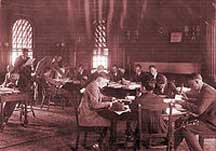 |
|
The parlor
of Phillips Brooks House at Harvard, the place of Laurie's announcement.
This picture was taken about 60 years earlier, however. |
||
You could have heard a pin drop in the fellowship meeting. Poor, sweet, well-meaning, naïve Laurie had no idea that everyone else in the room believed that Christians should not become intoxicated, whether with alcohol or drugs. From our point of view, Laurie’s strategy required her to act in ways contrary to the imperative of Scripture, “Do not get drunk with wine, for that is debauchery; but be filled with the Spirit” (Ephesians 5:18).
I was glad that nobody criticized Laurie in the meeting. One of the more mature women in the fellowship took her aside afterwards and talked with her about the inappropriateness of smoking dope with a roommate. Laurie was surprised at first, but then understood the problem.
Please understand that I’m not holding up Laurie’s action as something to be imitated. We’re to be light, not to light up! I don’t believe Christians should become intoxicated, no matter what the substance. (Well, okay, coffee and donuts are permissable.) But I do appreciate Laurie’s heart. In her zeal to share Christ with a roommate she made an unwise choice. But at least she had such zeal! I know many, many Christians who’d never think of using marijuana – and who’d never think of sharing Christ with their non-Christian friends.
So, though I hope I have more discernment than Laurie did, I also hope I have her heart for Christ and for those in my life who don’t know him. Even if I won’t light up with my friends, I am called to be a light in the world. And so are you.
Skipping Church as a
Strategy for Evangelism
Part 5 in the series “Salt and Light”
Posted at 10:00 p.m. on Tuesday, May 25, 2004
In college I was an active member of the Harvard-Radcliffe Christian Fellowship. This group, which met weekly for worship and teaching, emphasized the importance of small groups. So I joined a small group in my freshman year, and soon it was essential to my life. In this group I found support, love, challenge, and prayer. I never missed my weekly small group meeting, no matter how late I had to stay up doing homework because I’d spent two hours at the group.
| One of the things I shared with my small
group was my concern for my roommate Henry. I liked Henry a lot, but
he was not a Christian. Though he seemed to be interested in Christianity,
he had lots of reasons for his lack of faith. And, though Henry and
I frequently talked about my faith, he seemed strangely resistant.
In February of our freshman year, Henry received terrible news from his sister who lived in Henry’s home state of Florida. Their mother, who had symptoms of Alzheimer’s, had taken a decided turn for the worst. Henry was deeply worried by this news, wondering if he should quit school and go home. “Let’s talk about it over dinner,” I suggested. “But you’ve got your small group tonight,” Henry objected. “You always have dinner with your group on Wednesdays.” |
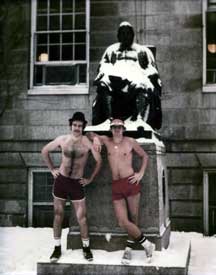 |
|
My roommate
Henry (right) and me in front of the statue of John Harvard. |
||
Now I was confused. Henry spoke the truth. I did always eat with my group on Wednesdays. And I didn’t want Henry to think that my small group wasn’t important in my life. Yet, I felt like I should be with him, not my group. Yet, on the other hand, I knew the other group members would worry if I didn’t show up. (Remember, this was long before cell phones!) Still, it seemed like staying with Henry was the right thing to do.
“I know I never miss my group,” I finally answered, “but I think I need to hang out with you tonight. Let’s go have dinner.”
So we did. And we talked and talked, long into the night. Partly we talked about God and faith and how God could let this happen to Henry’s mother.(Henry's father had died several years earlier.) Though Henry didn't become a Christian that night, I sensed a striking change in his attitude. It was as if he now trusted my opinions rather than always wanting to challenge them.
Throughout the next year and a half Henry and I spent hours and hours talking about Christianity. Then, in the summer before our junior year, he gave his life to Christ.
I asked Henry once why his attitude toward me, and, indeed, toward Christianity in general, changed from where it had been early in our freshman year. “It started that night,” he explained, “when you skipped your small group to be with me. Until that night, I never really trusted you. I had known other Christians in high school and they always ended up being hypocrites. But when you were willing to miss your group – I knew how much it meant to you – then I knew that your faith was genuine.”
When I tell this story in a sermon, I always wonder what will happen. Will members of my church start making it a habit to skip church in order to hang out with their non-Christian friends? Will the local golf courses be filled with my church members on Sunday mornings as they try to show love to their non-believing friends? So far this hasn’t happened. But, in spite of how much I think involvement in Christian fellowship is essential, there are times when skipping a small group or a worship service is exactly the right thing to do. It’s all part of being the salt of the earth – not sequestered in the salt shaker – but sprinkled out into the world.
Rallying Against Hate
Part 4 in the series “Salt and Light”
Posted at 10:00 p.m. on Monday, May 24, 2004
Some time ago, Michael Coffey moved to Garden Grove, a city in Orange County, not far from where I live. An African-American living in a neighborhood where he was a distinct minority, Coffey heard occasional racial slurs from some of the neighborhood youths. But then he was shocked to find a cross burning on his front lawn, a sadly ironic sign of racial hatred. The next Sunday afternoon, Coffey was shocked once again by what he saw in front of his home. This time, however, it was a happy surprise. About fifty people gathered to show their support for Coffey and to protest against racial hatred. These were Christians from several churches in Orange County, who had come after Sunday services to demonstrate. |
 |
|
The cross,
a symbol of love and life, becomes a symbol of hatred and death
when burned on someone's front lawn. |
||
The leader of the rally, Frank Eilkor, explained their purpose: “Hate is a cancer that will never go away unless that cancer is removed by community support. The cancer that goes to Mr. Coffey today can come for me tomorrow."
A pastor from one of the participating churches added, "Jesus said love your neighbor. He didn't say love your white neighbor. We're just here to say we love you."
When the demonstrators learned that Coffey had also been victimized by some renters who had vandalized his property, they offered to return the next weekend to help him repair the damage.
Don’t you love this story? I do. It’s such a great picture of the church in action, fighting hatred and extending the love of Christ. In a world that is becoming more and more violent and hateful, we Christians have an exceptional opportunity – and a excellent responsibility – to live as salt and light, so that people might see the presence of God in us. Fighting racial hatred and helping a victim restore his property – what better way to shine with the light of Jesus!
(You can read the whole story from an article in the LA Times, but you’ll have to pay for it.)
The Pizza Church
Part 3 in the series “Salt and Light”
Posted at 10:00 p.m. on Sunday, May 23, 2004
| In my last post I described how my former
church, The First Presbyterian Church of Hollywood, had earned a good
reputation in its community by offering help to people in need. My
current church, Irvine Presbyterian, is located in the midst of an
upper-middle class suburb. Although our neighbors sometimes deal with
the threat of homelessness, this is relatively rare. Our challenge,
therefore, is to figure out how we can be salt and light in our own
place and time. One answer: Pizza Lunch!
Recently I was chatting with a young woman who worked at Tully’s Coffee, a favorite coffee bar in Irvine. “You’re a pastor, right?” she asked. “Yes, I am” I answered. |
 |
|
The patio of Irvine
Presbyterian Church. Though quiet today, things will be quite different
on Friday at lunchtime. |
||
“Where is your church at?” she said, with questionable grammar.
“I’m pastor of the Presbyterian church over that way,” I replied, pointing in the general direction of my church.
“Across from the high school?” she asked, with excitement in her voice.
“Yes, right across from Woodbridge High School,” I said.
“YOU’RE THE PIZZA CHURCH!” she exploded. “I’ve been to your church. It’s cool!”
“The Pizza Church,” now that’s a name I hadn’t heard before. Frankly, I rather like it. I knew what this girl was referring to. For the last several years, every Friday we serve a simple lunch of pizza and soda to about 300 high school students. We charge what it costs us, not including countless volunteer hours from those who serve the pizza. We do this as a way of showing hospitality to the students, most of whom wouldn’t otherwise step foot on our church campus. In time, some become friends and even begin to be part of our youth group. Others are like the young woman in Tully’s, an occasional pizza patron, nothing more.
But even if the majority of the Pizza Lunch students never make it to a worship service or youth group meeting, at least they come away with a positive experience of church. They think of our church as a friendly place where they are welcome. My hope and prayer is that, in time, this will make it easier for these student to darken the door of a church when they’re looking for something more important than pizza.
In Matthew 25 Jesus tells the story of a king who surprises his subjects by rewarding them for caring for him. “For I was hungry and you gave me food, I was thirsty and you gave me something to drink, etc.” (Matt 25:35). I wonder, I just wonder, if someday Jesus will say to the Pizza Lunch volunteers, “For I was a hungry teenager and you gave me pizza, I was a thirsty student and you gave me a soda.”
The Church That
Helps People
Part 2 in the series “Salt and Light”
Posted at 10:00 p.m. on Saturday, May 22, 2004
| One day while I was an associate pastor
at the First Presbyterian Church of Hollywood, a woman came to the
church office seeking help. Her desperation was obvious as I began
to speak with her.
“You’ve got to help me,” she said. “I’m about to be evicted from my apartment. If this happens, I’ll be homeless. I don’t have anywhere to go.” “Why are you going to be evicted?” I asked. |
 |
|
A sketch of
the First Presbyterian Church of Hollywood |
||
“Because I’m not up to date on my rent. A few weeks ago I lost my job, so I have fallen behind in my payments. But I have a new job. It starts next week. I’ll be able to pay then. But if I’m evicted, I’ll lose my apartment and my security deposit. I don’t know what I’ll do.”
“What would you like me to do for you?” I queried.
“I’d like you to come and talk to my manager. Maybe you could convince him to let me stay for a couple more days.”
This plan seemed like a shot in the dark to me, but I consented. First I called the woman’s new employer, just to confirm her story. Everything checked out. Then I drove the woman to her apartment building. When we arrived, we found the manager. He scowled as we approached.
“Hello,” I said, extending a hand and trying to smile. “I wonder if I might speak to you for a moment.”
Refusing my hand, he said, “I don’t want to talk to you. She needs to get her stuff out now.”
“I understand your concern,” I continued gently, “but I’m wondering if we could talk about her situation. I’m one of the pastors at the Hollywood Presbyterian church over there, and I’d like to see if we can work out a situation so this woman can stay here.”
“No way,” he insisted. “She hasn’t paid her rent. She needs to leave.”
“But she has a job that will start next week, then she can pay.”
“I’ve heard that line before,” he objected. “You can forget it . . . . Wait a minute! Where did you say you were from?”
“I’m one of the pastors at the Presbyterian church,” I answered, handing him my business card.
“I know about your church,” he said in a firm voice as I braced myself for some critical remark, “and I know that your church helps people. A friend of mine was going through a hard time and you people helped him out.”
“We try,” I admitted.
“Okay,” he said in a much kinder voice, “because you’re vouching for her, I’ll let the woman stay. But only until the end of next week. Then she’ll have to pay.”
“Great,” I replied. “If you have any problems, you’ve got my card.”
With that, I turned to say good-bye to the stunned, grateful woman and then climbed back into my car. On my way back to church I thought I had witnessed a miracle. Such a change of heart in the manager! And it wouldn’t have happened except for the reputation of the church in the community.
Of course it doesn’t always work out this way. But how I wish all churches were known in their communities as being helpful to people. It’s part of what Jesus described as being salt and light in the world:
“You are the salt of the earth; but if salt has lost its taste, how can its saltiness be restored? It is no longer good for anything, but is thrown out and trampled under foot. You are the light of the world. A city built on a hill cannot be hid. No one after lighting a lamp puts it under the bushel basket, but on the lampstand, and it gives light to all in the house. In the same way, let your light shine before others, so that they may see your good works and give glory to your Father in heaven. (Matt 5:13-16)
In my next post I’ll describe a very different way of being salt and light in a very different kind of community. Stay tuned . . . .
Forgiving Our Dentist?
Part 1 of the series "Salt and Light"
Posted at 10:00 p.m. on Friday, May 21, 2004
When my daughter Kara was four years old I taught her to say the Lord’s Prayer. Well, at least a version of the Lord’s Prayer. You see, Kara had trouble articulating some of the tricky language of this prayer. For “Hallowed be they name” she said, “Hollywood be my name.” Better still, in place of “Forgive us our debts as we forgive our debtors” Kara chimed in with “Forgive us our dents as we forgive our dentist.” No joke! Though she had only been to the dentist once in her short life, Kara figured that he needed some forgiveness. Indeed, many dentists do!
The dentist who looked after my teeth when I was growing up needed more than a some forgiveness. From my youthful perspective, he was mean. It wasn’t just that he hurt me when giving me fillings, which, I suppose, was inevitable. But he wasn’t kind about it. Gruffness and intimidation ruled in his office, and I submitted to the whole painful, humiliating process.
Once I had left home for college and didn’t have parents who made me go to the dentist, I stopped going altogether. In fact, from the time I was eighteen until I was forty, I made only one visit to a dentist, and this because my wife set up the appointment and lovingly pressured me to go. But, once I turned forty, I knew that I would pay a heavy penalty if I continued avoiding dentists, so I resolved to face my fears head on and start going to the dentist on a regular basis.
By God’s grace, I began seeing Dr. Richard Oliver. Now, seven years, four crowns, three filling replacements, and fourteen cleanings later, I can truly say that my experiences of Dr. Oliver and his staff have actually been painless and almost, dare I say it, pleasant.
Take my most recent visit, for example. When I arrived for my appointment I had to wait about thirty seconds before Ruth, my hygienist, invited back to her office. That’s an average wait in Dr. Oliver’s office: thirty seconds! How many medical or dental offices could measure up to this level of respect of patients and their time? On my walk back to Ruth’s cubicle, a couple of people greeted me pleasantly. Ruth, always friendly, quickly got down to the business of cleaning my teeth. Her work was flawless. A couple of times she checked in with me to make sure she hadn’t hurt me, which she hadn’t. My teeth were in very competent hands.
I didn’t need to see Dr. Oliver during this visit. But when he’s worked on me in the past, I’ve marveled at his skill and care. Through all of those crowns and fillings, never once have I felt any pain, not even when he has given me those dreaded Novocaine shots – the ones that made me cry when I was a child. The only fear I have left of dentists is that someday Dr. Oliver will retire and I’ll have to find a new dentist. (Truly, I do think of this almost every time I leave his office. The good news is that Dr. Oliver’s son is following in his father’s footsteps!)
The outside of Dr. Oliver’s practice is deceptively humble: a storefront in a small shopping center in La Palma, California. The inside, while not plush, has been carefully designed to maximize the comfort – might I almost say – the enjoyment of the patient. Dr. Oliver is a Christian, who, along with his partners and staff, sees offering high-quality, caring dentistry as a ministry. His practice makes a special effort to provide affordable medical care for all people, including those of limited financial means. When I consider the way Dr. Oliver and company operate, I think of Jesus’ statement that we are to be salt and light in the world. |
 |
Tonight when I tuck my daughter into bed and pray with her, she won’t mess up the words of the Lord’s Prayer. She now knows that we need forgiveness for our “debts,” not our “dents,” and that we need to forgive our “debtors,” not our “dentist.” The truth is that I have no need to forgive my dentist anymore. What I feel for my dentist these days is no longer anger and fear, but appreciation and gratitude.
Why? For God’s Sake, Why?
Posted at 10:00 p.m. on Thursday, May 20, 2004 Here are a few tidbits from the Guinness Book of World Records:
Karen Stevenson of Merseyside, England consumed 2,780 cold beans, one by one, with a cocktail stick, in 30 minutes. Talk about gastronomical accomplishments, how about this one? During the course of four days in September, 1980, Jay Gwaltney ate the leaves, branches, and trunk of an eleven-foot-tall birch tree. But the greatest eater of all time is Michel Lotito of Grenoble, France, who has been eating metal and glass since 1959. His diet since 1966 has included seven bicycles, a supermarket cart, seven television sets, and a Cessna light aircraft, which he ate in Caracas, Venezuela. (Why doesn’t somebody send this guy to Burger King?) |
 |
|
Michel Lotito enjoys a little snack. |
||
Even ministers can indulge in a bit of silliness. On November 23, 1978, Baptist preacher Hans Mullikin arrived at the White House in Washington D.C., having crawled all but eight of the 1600 miles from Marshall, Texas. When he arrived and asked to speak with the President, he was told that Mr. Carter was too busy. (What a surprise!) Asked why he did such an odd thing, Mr. Mullikin explained, “I just wanted to show America that we need to get on our knees and repent. This is something I had in my heart and wanted to do for my country.” No doubt Mr. Mullikin meant well, but I do worry just a bit about his discernment.
The great Greek philosopher Socrates once said “The unexamined life is not worth living.” Though you and I might not indulge in such silliness as eating televisions and crawling across several states, I wonder if we sometimes go through our daily routines without stopping to wonder why. I can often get stressed out over things that have no eternal significance whatsoever, and in the process miss out on some of life’s greatest joys. Why? Why do I live like this?
As a Christian, I want my life to count for God’s purposes. I want to invest my days, not in silliness, but in ultimate significance. Today, maybe I’ll think twice before I waste precious moments on trivia. I may not ever make it into the Guinness Book of World Records, but maybe my page in the Book of Life will be just a bit fuller because I asked the question “Why?” before I acted.